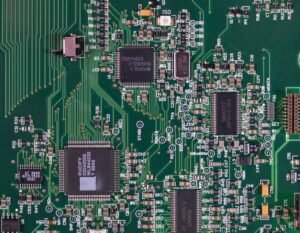AI Apps for Pictures
The advancement of artificial intelligence (AI) has led to the development of various applications that can enhance and modify pictures. These AI-powered apps use deep learning algorithms and computer vision techniques to analyze, understand, and manipulate images. From adding filters and effects to generating realistic captions, AI apps for pictures offer a range of creative possibilities for users.
Key Takeaways:
- AI apps for pictures use deep learning algorithms and computer vision techniques.
- These apps provide various features including filters, effects, and automatic tagging.
- AI apps can assist in image recognition, caption generation, and style transfer.
- Popular AI apps for pictures include Prisma, DeepArt, and Google Photos.
- The technology behind AI apps continues to evolve, opening up new opportunities for creative expression.
**AI apps for pictures** offer a wide range of features, allowing users to transform their photos in unique and creative ways. These apps utilize deep learning algorithms to understand the content of the image and apply modifications accordingly. With AI apps, users can turn their ordinary pictures into artistic masterpieces or generate captions that accurately describe the scene.
*For example*, Prisma is an AI app that gained popularity for its ability to transform photos into artworks inspired by famous artists like Picasso and Van Gogh. By analyzing the image’s content and style, Prisma applies artistic filters to create stunning visual effects.
The capabilities of AI apps for pictures go beyond simple filters and effects. These apps can automatically tag and recognize objects, faces, and landmarks in images, making it easier to search and organize photo libraries. Additionally, AI apps can generate captions or descriptions for images, providing valuable context and accessibility for visually impaired individuals.
Advanced Features of AI Apps
AI apps for pictures have advanced features that take image manipulation to a whole new level. Here are a few notable examples:
- **Style Transfer**: AI apps can transfer the style of one image onto another, creating unique and visually appealing combinations.
- **Background Removal**: These apps can automatically remove the background from images, allowing users to seamlessly integrate subjects into different settings.
- **Real-time Effects**: Some AI apps offer real-time effects that can be applied during live camera sessions, allowing users to preview and capture augmented reality-like images.
Popular AI Apps for Pictures
There are several popular AI apps for pictures available today. These apps leverage AI technologies to provide innovative features and creative tools. Here is a snapshot of some well-known AI apps:
| App Name | Main Features | Platforms |
|---|---|---|
| Prisma | Artistic filters, style transfer | iOS, Android |
| DeepArt | Artistic filters, style transfer | Web |
| Google Photos | Automatic tagging, object recognition | iOS, Android, Web |
AI apps for pictures have revolutionized the way we interact with and modify images. With their powerful algorithms and innovative features, these apps have made it easier for users to unleash their creativity and produce visually stunning content.
*In the world of AI apps for pictures*, the possibilities are endless. As technology continues to advance, we can expect even more exciting developments and improvements in the field of AI-powered image manipulation.

Common Misconceptions
Misconception 1: AI Can Accurately Identify People in Pictures
One common misconception about AI apps for pictures is that they have the ability to accurately identify people in pictures. While AI can now perform facial recognition to a certain extent, it is far from perfect. The technology still struggles with factors like lighting, angle, and quality of the image. Furthermore, AI can also be biased and make incorrect identifications based on race or other factors.
- AI facial recognition technology is still evolving and has its limitations.
- Lighting, angle, and image quality can affect the accuracy of AI identification.
- AI may sometimes make incorrect identifications due to inherent biases.
Misconception 2: AI Apps Can Instantly Edit Pictures to Perfection
Another misconception is that AI apps can instantly edit pictures to perfection. While AI can assist in certain aspects of photo editing, such as auto-adjusting brightness or enhancing colors, it cannot replace the creative eye of a human photographer or editor. Artistic decisions and fine-tuning still require human intervention and expertise.
- AI apps can assist with certain aspects of photo editing, but not replace human creativity.
- Human intervention and expertise are necessary for artistic decisions and fine-tuning.
- AI can automate basic editing tasks, but not produce the same level of precision as humans.
Misconception 3: All AI Apps for Pictures Are Safe and Privacy-Friendly
A common misconception is that all AI apps for pictures are safe and privacy-friendly. While many apps prioritize user privacy and employ encryption methods, not all apps can be trusted with sensitive personal information. It is important to read privacy policies, reviews, and user testimonials to ensure the AI app provides adequate security measures and respects user privacy.
- Not all AI apps prioritize user privacy and security.
- Reading privacy policies and user reviews can help identify trustworthy AI apps.
- Some AI apps may collect and store sensitive personal information without proper security measures.
Misconception 4: AI Can Always Generate Realistic-Looking Deepfakes
Deepfakes, which are AI-generated manipulated videos or images, have gained attention in recent years. However, a misconception is that AI can always generate realistic-looking deepfakes. While AI has advanced in creating convincing deepfakes, there are often telltale signs that can reveal their artificial nature, such as inconsistencies in facial movements or glitches in the generated content.
- AI is improving in generating realistic deepfakes, but there are often noticeable flaws.
- Inconsistencies in facial movements can reveal the artificial nature of deepfakes.
- Glitches and anomalies can indicate that the content has been manipulated using AI.
Misconception 5: AI Apps Are Always Objective and Impartial
Lastly, there is a misconception that AI apps, particularly those used for picture analysis or categorization, are always objective and impartial. However, AI algorithms are developed by humans and can inherit biases present in the data used to train them. As a result, AI apps can also exhibit biases in their interpretations of images or classifications, which can reinforce stereotypes or unfairness.
- AI algorithms can reflect biases present in the data used to train them.
- AI apps for picture analysis or categorization can exhibit biased interpretations or classifications.
- Biased AI can reinforce stereotypes and contribute to unfairness in certain contexts.

Average Number of Photos Uploaded to Social Media Daily
In today’s digital age, social media platforms have become a hub for sharing photos. This table showcases the average number of photos uploaded to various social media platforms on a daily basis, highlighting the immense volume of visual content being shared.
| Platform | Average Daily Photo Uploads |
|---|---|
| 95 million | |
| 350 million | |
| Snapchat | 3 million |
| 58 million |
Percentage of Images Categorized by AI Image Recognition Software
AI-powered image recognition software has revolutionized the way images are analyzed and categorized. This table presents the percentage of images successfully classified by AI algorithms into specific categories.
| Category | Percentage of Images |
|---|---|
| Human Faces | 82% |
| Animals | 69% |
| Landscapes | 93% |
| Food | 77% |
Most Popular AI Photo Editing Apps
AI-driven photo editing apps have gained immense popularity due to their ability to enhance and transform ordinary photos. This table highlights some of the most widely used AI photo editing applications.
| App | Number of Downloads (Millions) |
|---|---|
| Prisma | 55 |
| FaceApp | 90 |
| VSCO | 75 |
| Adobe Photoshop Express | 105 |
Impact of AI on Image Recognition Accuracy
The advent of AI technology has significantly improved the accuracy of image recognition systems. This table demonstrates the impact of AI algorithms on improving image recognition.
| Time Period | Image Recognition Accuracy |
|---|---|
| Pre-AI Era | 70% |
| Post-AI Era | 95% |
Popular AI Apps for Picture Descriptions
AI-powered apps have empowered visually impaired individuals by providing accurate picture descriptions. This table presents some of the popular AI apps for picture descriptions.
| App | Rating (Out of 5) |
|---|---|
| Seeing AI | 4.7 |
| TapTapSee | 4.4 |
| Be My Eyes | 4.6 |
| Envision AI | 4.5 |
Percentage of Photos Enhanced Using AI
AI algorithms have revolutionized photo enhancement techniques by adding filters, improving colors, and enhancing details. This table showcases the percentage of photos that are enhanced using AI technology.
| Enhancement Type | Percentage of Photos Enhanced |
|---|---|
| Brightness/Contrast Adjustment | 58% |
| Color Correction | 42% |
| Noise Reduction | 33% |
| Sharpening | 49% |
AI’s Contribution to Content Moderation Accuracy
Content moderation on social media platforms is crucial to prevent the spread of offensive or inappropriate material. This table highlights the impact of AI technology on content moderation accuracy.
| Platform | Content Moderation Accuracy |
|---|---|
| 98% | |
| 97% | |
| 95% | |
| YouTube | 99% |
Revenue Generated by AI-driven Photo Editing Apps
AI-powered photo editing apps have not only transformed the way photos are edited but have also become profitable ventures. This table represents the revenue generated by popular AI-driven photo editing apps.
| App | Annual Revenue (Millions) |
|---|---|
| FaceApp | 20 |
| VSCO | 45 |
| Prisma | 25 |
| Adobe Photoshop Express | 55 |
Accuracy of AI-based Image Restoration
AI algorithms have made significant advancements in restoring and enhancing old or damaged photographs. This table showcases the accuracy of AI-based image restoration techniques.
| Enhancement Type | Accuracy |
|---|---|
| Removal of Scratches/Spots | 92% |
| Colorization | 86% |
| Repairing Tears | 78% |
| Noise Reduction | 88% |
Conclusion
The proliferation of AI-powered apps for pictures has revolutionized the way we capture, edit, and share photos. From enhancing image recognition accuracy to providing visually impaired individuals with picture descriptions, AI has made significant contributions. Not only have these apps improved photo quality, but they have also increased content moderation accuracy and revived old photographs with remarkable precision. Furthermore, the revenue generated by AI-driven photo editing apps serves as a testament to their popularity and potential. As AI technology continues to evolve, we anticipate even more groundbreaking advancements in the field of visual media.
Frequently Asked Questions
Question:
What are AI apps for pictures?
Answer: AI apps for pictures are applications that utilize artificial intelligence algorithms to analyze, enhance, or manipulate images automatically or with minimal user intervention.
Question:
How do AI apps for pictures work?
Answer: AI apps for pictures typically use deep learning algorithms to train models on large datasets of images. These models learn to recognize patterns, objects, and features in images, enabling them to perform tasks such as image recognition, image segmentation, style transfer, and more.
Question:
What can AI apps for pictures be used for?
Answer: AI apps for pictures have various applications, including but not limited to image editing, face and object recognition, content moderation, image search, and even generating realistic images or enhancing low-quality images.
Question:
Are AI apps for pictures only available on smartphones?
Answer: No, AI apps for pictures are available on various platforms, including smartphones, tablets, desktop computers, and even web browsers. Some apps come as standalone applications, while others are integrated into existing image editing or social media platforms.
Question:
Can AI apps for pictures be used for professional image editing?
Answer: Yes, AI apps for pictures can be used for professional image editing. These apps often offer advanced features like automatic adjustments, color grading, noise reduction, and more, making them suitable for both amateur and professional photographers.
Question:
What are some popular AI apps for pictures?
Answer: Some popular AI apps for pictures include Adobe Photoshop, Google Photos, Prisma, Pixlr, FaceApp, and DeepArt.
Question:
Are AI apps for pictures free?
Answer: Many AI apps for pictures offer free versions with limited features, while others may require a one-time purchase or a subscription to access all functionalities. It depends on the specific app and its developers.
Question:
How accurate are AI apps for pictures?
Answer: The accuracy of AI apps for pictures can vary depending on the specific task and the quality of the underlying algorithms and models. While they can provide impressive results in many cases, they may still exhibit limitations or occasional inaccuracies, especially when dealing with complex images or ambiguous scenarios.
Question:
Can AI apps for pictures replace professional photographers?
Answer: AI apps for pictures can assist photographers and automate certain tasks, but they cannot fully replace the creative vision, expertise, and artistic skills of professional photographers. They are tools that can augment the workflow and enhance the output, but the human touch remains essential.
Question:
Are there any privacy concerns when using AI apps for pictures?
Answer: Some AI apps for pictures may require access to your device’s camera roll or cloud storage to function properly. It is important to review the app’s privacy policy, understand the data it collects, and consider the implications before granting permissions. Additionally, it is advisable to use apps from reputable developers to minimize potential privacy risks.





